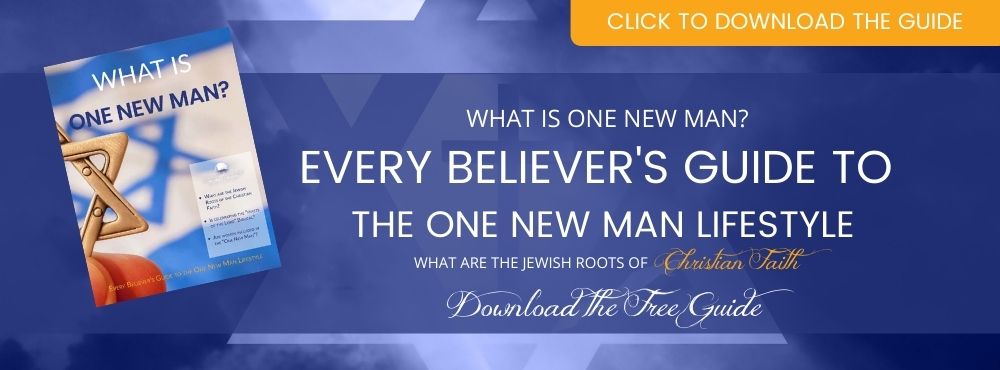“ONE NEW MAN” – What Should this Mean to the Believer? (Part 5)
Table of Contents
In the previous blogs of this series, we discussed the separation of the Jew and the Gentile. This led to mixture in the tenets of the Christian faith and disunity among the people. Our Lord had fervently prayed for our unity before He was crucified. We see this beautiful prayer in John 17. Just as Jesus prayed to the Father for our unity in John 17, the Apostle Paul speaks of us all having access to the Father by one Spirit. This unity is developed when we embrace the full Word of God which includes embracing the Jew and each other.
So, how do we embrace the Word of God?
As previously stated in the first of this series of the “One New Man”—What Should this Mean to the Believer,” we discussed the need to actively examine all that we are told or read. We need to search out the scripture to “see if it is so” (Acts 17:10-11). We need to also ask questions regarding concept validity and its relationship to the rest of the Word.
Through the years, various concepts and traditions have risen that are commonly accepted. We must challenge these concepts, traditions and beliefs, and ask:
- Do they match up to scripture?
- Are we being selective in how we use scripture to only support our own point of view or belief?
- Are we asking the Holy Spirit to guide us as we examine His Word?
- Are we humble before the Lord, asking Him to guide and correct us in our own thinking, allowing the Holy Spirit to be our guide.
- How do we look at or use the scriptures?
In embracing God’s Word, we have to question where we worship, how we worship, and with whom we associate. Do others around us embrace God’s Word? Do they get excited as well, and want to examine the truth with us?
God’s Word has a way of exposing us to ourselves and consequently to others. When we accept Christ’s call, it’s much more than “a ticket” to Heaven. It is a call to embrace His lifestyle, to use our talents for Him, to learn all we can about Him, and to share and teach others about Him.
How do we embrace each other?
Most of us have been raised to accept and work within family traditions, community traditions, and hopefully religious traditions. Traditions are good. They help us define ourselves to ourselves, and teach us how to relate to one another. However, traditions can prevent us from embracing others for who and what they are.
If you have been blessed to grow up among people of other cultures and beliefs, and are able to associate with those of differing religious traditions and denominations within Christian organizations, you will most likely be able to accept others where they are in their faith walk. If you are exposed to those of the Jewish faith with their traditions, you will be able to appreciate the fullness of their devotion to God and what their celebrations mean to them.
You will most likely be able to examine and evaluate your own faith and beliefs in a more thorough way, which will allow you the opportunity to share your faith with greater conviction and understanding.
You may be exposed to many different churches of various denominations that may lead you to new ways of understanding the Bible. The unfortunate view of many of these churches (denominations) is that they often don’t embrace the Holy Spirit’s role in our walk with Christ, and they have little or no knowledge of the Christian Jewish roots.

We need to understand and ask ourselves how we should embrace these different groups
Trying to convince them about the fullness of the scripture in light of Jewish traditions often has disastrous results. The only way to influence others to change is through our own total surrender to the Lord, allowing His signs and wonders to be demonstrated through us. We cannot do it on our own. It must be the work of the Holy Spirit.
So, witness to those who will listen, and live out Christ to those who will watch. Align yourself to Christ’s will with the help and guidance of the Holy Spirit. Reconciliation of the different Christian traditions begins with us (me and you).
Our goal is to seek first the Kingdom of God and His righteousness, and then through Him to love others. We will not curse them nor condemn them. We pray God’s blessing on them and that the Holy Spirit will place the desire for God’s will to become their will—to seek the Kingdom first in all things.
How do we embrace the Jew?
Becoming familiar with the Jew’s desire to serve God and by living Messiah before them is the best way to reach them. Only when the Holy Spirit prompts them can they be reached. Learning their ways and showing interest in their concerns and projects helps open the door to witness Messiah to them.
They don’t want your verbal witness. Christian people and organizations wanting to ‘convert’ them put off many Jews. We must understand that it is the Gentile who requires conversion. The Jew is ‘completed’ when they accept their Messiah in Yeshua.
Christianity is essentially a Jewish sect which makes us an extension of the Jewish belief system. Therefore, the Jew doesn’t need conversion… he needs completion! Their completion is to learn, understand, and embrace their Messiah.
Is reconciliation possible?
When the Apostle Paul wrote in Ephesians about the ‘One New Man,’ he was talking about a new creation—the joining of Jew and Gentile as One before God.
Essentially, we are a new human being, in love with God and each other with no prejudice, no hatred, and no separation.
2 Corinthians 5:16-19 says,
“So from now on we regard no one from a worldly point of view. Though we once regarded Christ in this way, we do so no longer. Therefore, if anyone is in Christ, the new creation has come: The old has gone, the new is here! All this is from God, who reconciled us to Himself through Christ and gave us the ministry of reconciliation: that God was reconciling the world to Himself in Christ, not counting people’s sins against them. And He has committed to us the message of reconciliation.”
If God reconciles us to Him, we must seek to reconcile to each other. Therefore, reconciliation is possible and it is our responsibility to go forward and reconcile with all, as the “One New Man.”
We hope that you have enjoyed this “One New Man”—What Should this Mean to the Believer” series, and that you have come away with a more complete understanding of the Jewish roots of our Christian faith. If you would like to learn more and live near House of David, in Fairland, Oklahoma, we offer classes that will help you gain additional insight into our Hebraic roots, and for some, their own Jewish heritage that has never fully been realized. For more information, please contact Curt Landry Ministries.
